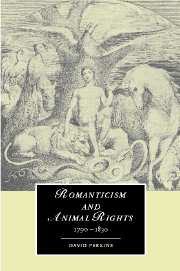Book contents
- Frontmatter
- Contents
- Preface
- Acknowledgments
- 1 In the beginning of animal rights
- 2 Grounds of argument
- 3 Keeping pets: William Cowper and his hares
- 4 Barbarian pleasures: against hunting
- 5 Savage amusements of the poor: John Clare's badger sonnets
- 6 Work animals, slaves, servants: Coleridge's young ass
- 7 The slaughterhouse and the kitchen: Charles Lamb's “Dissertation upon Roast Pig”
- 8 Caged birds and wild
- Notes
- Bibliographical essay
- Index
- CAMBRIDGE STUDIES IN ROMANTICISM
3 - Keeping pets: William Cowper and his hares
Published online by Cambridge University Press: 22 September 2009
- Frontmatter
- Contents
- Preface
- Acknowledgments
- 1 In the beginning of animal rights
- 2 Grounds of argument
- 3 Keeping pets: William Cowper and his hares
- 4 Barbarian pleasures: against hunting
- 5 Savage amusements of the poor: John Clare's badger sonnets
- 6 Work animals, slaves, servants: Coleridge's young ass
- 7 The slaughterhouse and the kitchen: Charles Lamb's “Dissertation upon Roast Pig”
- 8 Caged birds and wild
- Notes
- Bibliographical essay
- Index
- CAMBRIDGE STUDIES IN ROMANTICISM
Summary
The reform of prison conditions is forever associated with John Howard, whose single-minded, indefatigable investigations led to acts of Parliament in 1774. A few heroic personalities stand out in the abolition of the slave trade, such as William Wilberforce, Granville Sharp, and Thomas Clarkson. In the cause of slaves Clarkson was a “Moral Steam-Engine, or the Giant with one idea,” according to Coleridge, and had “listened exclusively to his Conscience, and obeyed its voice at the price of all his Youth & manhood, at the price of his Health, his private Fortune, and the fairest prospects of honorable ambition.” The cause of animals did not enlist comparably dedicated persons. It was an effort that one might take up occasionally, episodically, among other projects, paying for a sermon on the subject, giving one, or getting up a petition, or introducing a bill in Parliament. And then, in most cases, you went on to matters that concerned you more.
If literature has practical influence, no writer in the eighteenth century had more effect than William Cowper in transforming attitudes to animals and stimulating reform. He was quoted over and over in sermons, pamphlets, and in Parliament, sometimes from memory. He was not the most radical or the most eloquent poet on this subject, far less so than William Blake or Christopher Smart. But Cowper reached and moved opinion much more than they.
His impact depended on a combination of appeals radiating from the poetic image of himself and his way of life.
- Type
- Chapter
- Information
- Romanticism and Animal Rights , pp. 44 - 63Publisher: Cambridge University PressPrint publication year: 2003

